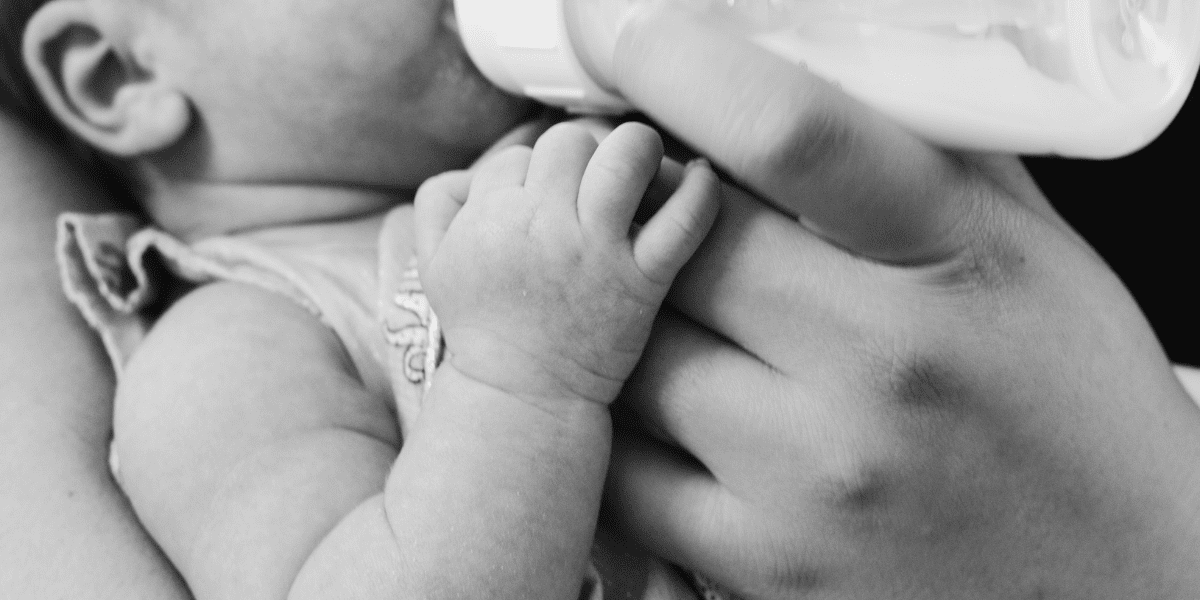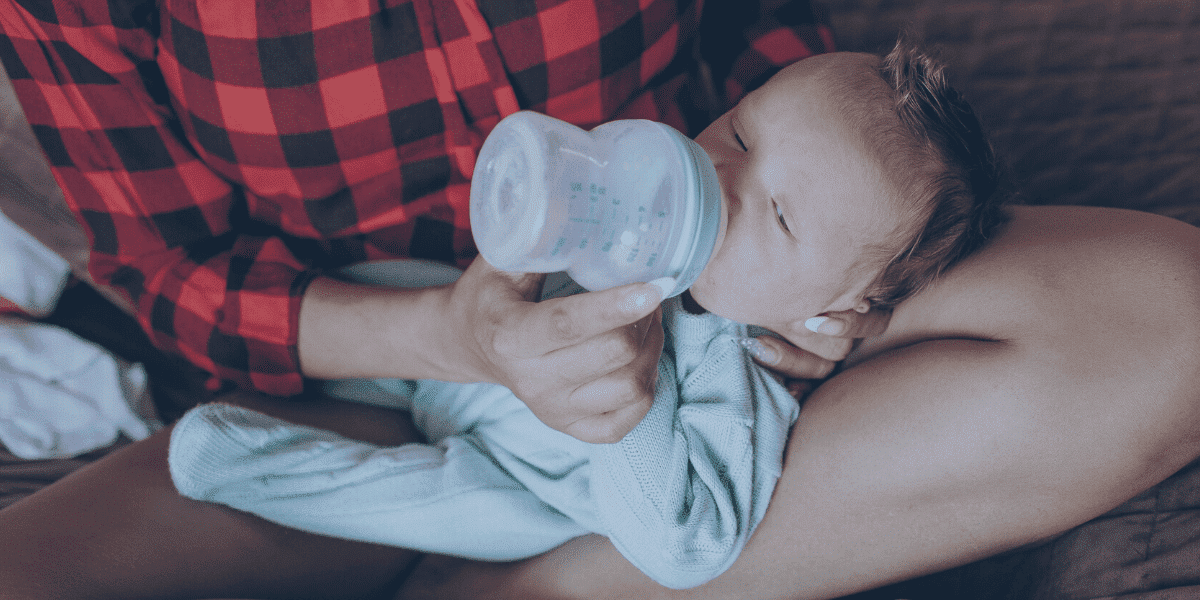What to give your baby if you have run out of formula varies greatly, depending on their age. Under no circumstances should you give babies water as a replacement, as this is a danger to them. If possible, try to keep a supply of Pedialyte for emergencies for babies aged 9+ months. You should also try contacting your local doctor, midwife, clinic, or foodbank for some emergency supplies of formula.
As an Amazon Associate, I earn from qualifying purchases. The links below maybe affiliate links. Please read my disclosure policy for more information.

So, you’ve found yourself in that emergency situation that you never wanted to be in. You have ran out of baby formula, the next feed is in an hour, and there is no way to get more right now. The best thing to do is to remain calm, and do not panic.
Fortunately, there are alternatives that you can use on a temporary basis to help your baby through this time. The measures put into place are dependant on your baby’s age, but don’t worry, because we’ve got all ages covered in this article.
What to do if You’ve Ran Out Of Formula
If you have run out of baby formula, the most important thing to do is to keep your baby hydrated.
Because of this, you might think that it’s okay to just give them water, but this is dangerous for babies under six months old; even at six months old, your baby should only receive water in small quantities, and only if there is no alternative. You shouldn’t even use water to dilute any remaining baby formula left.
Giving babies water upsets the balance of electrolytes in their delicate systems, resulting in a condition known as hyponatremia. Hyponatremia can cause brain swelling, seizures, and in extreme cases, death.
In emergencies, instead of giving babies water, some paediatricians recommend keeping a small supply of Pedialyte in the house. Pedialyte is a rehydration drink that can be found in most stores, and is safe for babies aged 9+ months to consume.
Because of Pedialyte’s specialised ratio or sugar, minerals and water, it is the ideal drink to keep your baby hydrated without affecting their electrolyte balance.
Emergency Formula Alternatives
As stated above, each age range has different requirements when temporarily replacing baby formula.
- 0 – 6 Months: This is the hardest age range to provide alternatives for. At this stage, your baby cannot drink water, nor should you dilute what little baby formula you may have left with water or other liquids. If you have anyone who can help you get the formula you need, whether it’s a neighbor or a family member, you should contact them immediately.
If the problem is affording baby formula, then you can contact a doctor, midwife, clinic or foodbank, and should provide you with formula on a temporary basis. If the baby is at least four months old, you can temporarily offer puréed food; this can only be done for a day at most, until you get the formula you need. - 6 – 9 Months: Although baby formula / breast milk should be the main source of nutrition at this point, your baby should also be consuming solid foods too. Once again, you should avoid diluting the formula with water or other liquids.
However, if you have run out of formula, you may go at least two days by providing nutritional solids such as mashed up beans or lentils, porridge / oatmeal, full-fat yogurts, meats, and cheese that is low in sodium. - 9 – 12 Months: Baby formula / breast milk should still comprise the majority of the diet here, however solid foods should play a larger role than they did before. Should you have run out of formula, you can now provide small sips of water (between 2 – 4 oz daily).
Although you can now offer your baby water, you still shouldn’t use it to dilute formula. You may now use Pedialyte or any other oral rehydration for up to three days while you try to get more formula.
Once again, it is important to add nutritional solids such as mashed up beans or lentils, porridge / oatmeal, full-fat yogurts, meats, and cheese that is low in sodium into the diet.
If there is no other alternative, you may use pasteurised cow, goat or sheep milk, as long as you are also providing the solid foods; the animal milks are only to be used in the direst of circumstances. - 12 – 24 Months: Once your baby is fully on solids, they no longer have need for formula. At this stage in a baby’s development, any milk provided is to supply calcium, fat, and Vitamin D to the diet.
Should you run out of formula, the best thing to do is to supply solid foods rich in these nutrients, such as yogurt, cheese low in sodium, or full-fat cow, sheep or goat milk.
You can also offer your baby unrestricted water as long as they are getting their daily nutrient requirements from solid foods. If your baby is ill or having trouble keeping foods down, you can use oral rehydration solutions for up to three days.
Can I Use Home-made Baby Formula?
Although there are websites claiming to have found the perfect recipe for cheap, home-made baby formula, you should never try giving these to your baby.
Commercially manufactured baby formulas are held to an incredibly high standard, and undergo rigorous testing to ensure that they are safe, provide the required nutrition, and that they closely replicate the natural goodness of breastmilk.
There is no way to replicate this process in a home setting. It should also be known that he majority of home-made recipes use cow’s milk as a main ingredient which can cause nutritional deficiencies and other health problems to your baby.

Why Can’t I Dilute Formula With Water?
Water is readily available to the majority of us, but just because we have it doesn’t mean we can use it for our babies. However tempting it may be, water causes a myriad of problems to babies too young to process it.
The kidneys process any water that enters the body, but baby’s kidneys aren’t fully developed till they’re a year old. Because of this, adding water to a baby’s diet can cause water intoxication.
Water intoxication lowers the number of electrolytes in the bloodstream, which in turn can cause hyponatremia. In turn, hyponatremia can lead to brain swelling, seizures, and in extreme cases, death.
Besides that, watering down baby formula restricts the amounts of nutrients that babies are supposed to get from it; this can further cause problems with growth and development.
Who Can I Call For Help?
Sometimes, the problem with formula isn’t that you can’t get to the store in time, but rather that you can’t afford it right now. Although this is a horrible circumstance to find yourself in, there are people who can help.
- Doctors: Doctors usually have sample packs of different formulas for babies who are fussy eaters. If you contact them and explain your situation, they will offer you these on a temporary basis, until you have a permanent solution figured out.
- Clinics / Paediatric Units: Just like doctors, clinics and paediatric wards have supplies of baby formula for their patients. Clinics in particular are known for helping people get into programs which will keep them well supplied with baby formula while they need it.
- Food Banks: Nowadays, many communities have access to local food banks. To get access to a food bank’s supplies, you usually need a referral which you can get from Citizens Advice. Once signed up to a food bank, you will have help for as long as you need it, though there is usually a limit on how much you can take per visit.

Conclusion
Although running out of baby formula may feel like the end of the world, it’s not. There are people, charities, and organisations that you can turn to for help. It may be difficult to admit that you need help feeding your children, but it is time to be brave and do so for them.
Once you take the biggest step and ask for help, you may find yourself enrolled in programs that will provide you with the formula you need to help your baby grow, and with these programs comes support off professionals and other parents who have been through exactly the same thing that you’re facing now.
In the meantime, while you’re waiting for the baby formula to arrive, as long as you follow the three golden rules, you and your baby will be okay.
- Never use water to dilute your remaining baby formula, nor should you give babies water until you are certain they are old enough to drink it; the above guide will help provide the ages in which babies can consume water.
- Always keep a stash of rehydration liquids that are safe for babies to consume at hand.
- Whilst trying to provide the correct nourishment for your baby, follow the age guide above and everything will be okay.


